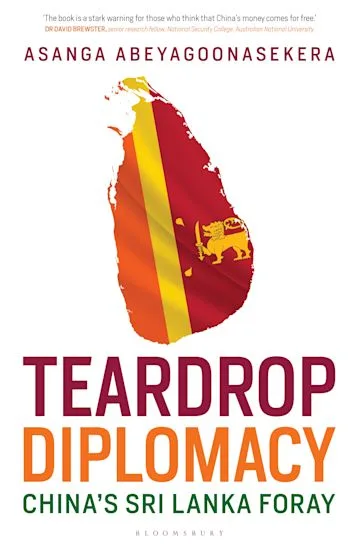
BOOK REVIEW
Teardrop Diplomacy: China’s Sri Lanka Foray
Asanga Abeyagoonasekera
Bloomsbury: India
The first impression after reading Asanga Abeyagoonasekera’s tear-drop diplomacy was not a praising type regardless of its catchy title. Yet I understood the gamut of the subject matter that Asanga intended to discuss was not an easy one with its most complex nature. In fact, his research acumen was not confined to the geopolitical currents encompassing the island nation. On the contrary, the book is an attempt to discuss issues ranging from domestic politics to foreign policy of Sri Lanka.
However, China remains the epicenter of all the 48 articles provided by Abeyagoonasekera in this compendium. It seems to indicate most of the scholars sitting in global think tanks in the West and India tend to project China as a nemesis for Sri Lanka’s current state of economic limbo. The phrase “ debt diplomacy” entered the lexicon of international politics based on the Chinese influence that penetrated Sri Lanka. The dichotomy between the Chinese undue influence in Sri Lanka and the reasons for the fragile status of the island needs to be analysed in making such an observation. In Abeyagoonasekera’s analysis of the Chinese factor in Sri Lanka in the aftermath of the war, he takes the same stance as the Western commentators by depicting China as a boogeyman. But he is well accurate in making his judgment on Chinese interests in the Indian Ocean and Sri Lanka, with its geopolitical imperative to fulfil Chinese strategic goals. Abeyagoonasekera refers to both US-India Indo Pacific strategy and Chinese Communist Party’s aspirations as both of them mention Sri Lanka’s importance.
In the section on geopolitics, the author highlights how Sri Lanka’s revered non-allied foreign policy doctrine went astray due to several strategic blunders committed during the Rajapaksa administration after 2009, which finally boom-ranged upon Mahinda Rajapaksa in the presidential elections of 2015. It is interesting to observe the author’s vehement criticism of the non-allied foreign policy of Sri Lanka. He states “The Sri Lankan foreign policy establishment continues to refer to the outdated non-aligned policy due to its past success in steering the country away from big power rivalry during the Cold War” ( p.15)
From his point of view, Sri Lanka should alter this aged neutrality mantra to a realist foreign policy that advocates strong partnerships with external powers, which will be beneficial for the national interest. This is an idea that should allude to the policymakers in Colombo to deviate from its lousy status in foreign affairs, which makes the country a laughing stock before the international community. Abeyagoonasekera sarcastically reminds us of the remarks made by Sri Lanka’s former foreign secretary Admiral Jayanath Colombage in 2021 declaring Sri Lanka’s foreign policy to be centered around India, which contradicted Gotabaya Rajapaksa’s foreign policy statement, which reassured the “ neutral and non-aligned “ status of the country. The perplexing nature of Sri Lanka’s foreign policy decision mechanism marred the country’s credibility and the damage made by the bureaucracy impacted upon forming a distrust among the international community.
Abeyagoonasekera made a prophetic statement in June 2021, a year before Sri Lanka stumbled into its worst nightmare of economic crisis and his prediction referred to the coming anarchy of Sri Lanka. In a situation when Gotabaya Rajapaksa, then president of Sri Lanka consolidated his power, making such a comment appeared to be highly unrealistic. Yet, Asanga Abeyagoonasekera was audacious in stating Sri Lanka will be in tatters as a result of unprecedented waves of political follies. In his criticism of President Gotabaya Rajapaksa’s decision to pardon Duminda de Silva, whose conviction the Supreme Court upheld in 2018, Abeyagoonasekera states
“Against this backdrop, the worsening human rights conditions and arbitrary pardoning of criminals will weaken the rule of law. The respected status of Sri Lanka as Asia’s one of oldest democracies was at stake by the arrogance of power and the author deplores the tragic fate that the country was embracing in 2021. In one of the articles contributed by Asanga Abeyagoonasekera to his compendium “ Teardrop Diplomacy”, he borrows the term Triumvirate from Roman history to describe the alliance of Gotabaya Rajapaksa, Basil Rajapaksa and Mahinda Rajapaksa as a coalition intended to kill the democratic institutions of Sri Lanka. While quoting Steven Levitz and Daniel Ziblatt’s modern classic “ How Democracies Die” Abeyagunasekera mentions democracies can be dissolved in spectacular fashion like from a coup d’etat or a less dramatic but equally destructive manner.
Notwithstanding the gravity of his arguments, there is a moral question stemming from Abeyagoonasekera’s vehement criticism of the Rajapaksa rule. First, his entry to public life in Sri Lanka had the fullest support from the Rajapaksa regime between the years 2011 and 2015 as Asanga Abeyagoonasekera was chosen by then President Mahinda Rajapaksa to lead the country’s top foreign relations think tank Kadirgarmar Institute for Strategic Studies. As a matter of fact, it was the infancy stage of the Chinese influence upon Sri Lanka and throughout his tenure as the executive director of the state-sponsored think tank, Abeyagoonasekera made no considerable effort to rectify the foreign policy blunders of the Rajapaksa regime. He rather enjoyed his momentum until he fell from Rajapaksa’s grace. In that context, all his dilemmas seemed to have risen after things fell apart with the regime, which raises a plausible assumption that the personal sentiments and discontent towards the regime coloured his judgment on Gotabaya Rajapaksa’s foreign policy.
On the whole, Abeyagoonasekera’s compendium is a compelling read echoing the problems faced by the island nation in its most crucial hour of history. His style of writing is lucid and devoid of unnecessary academic jargon. Thus, readers without pre-knowledge of Sri Lanka and its geopolitical entanglements can enjoy this work as the author’s selected articles in this book refer to the most significant events from scratch.
